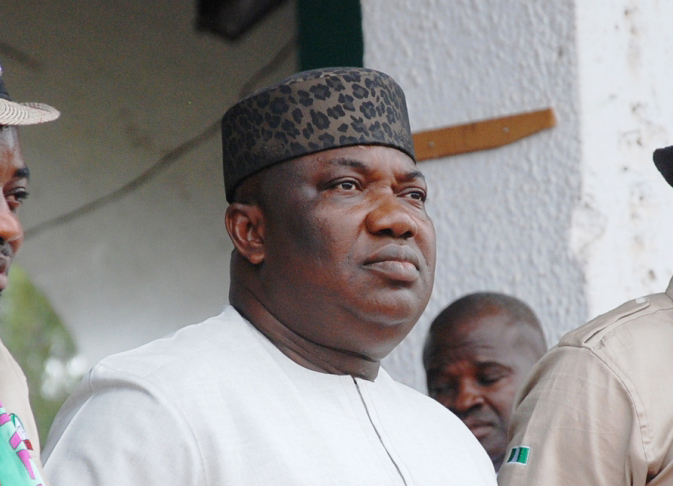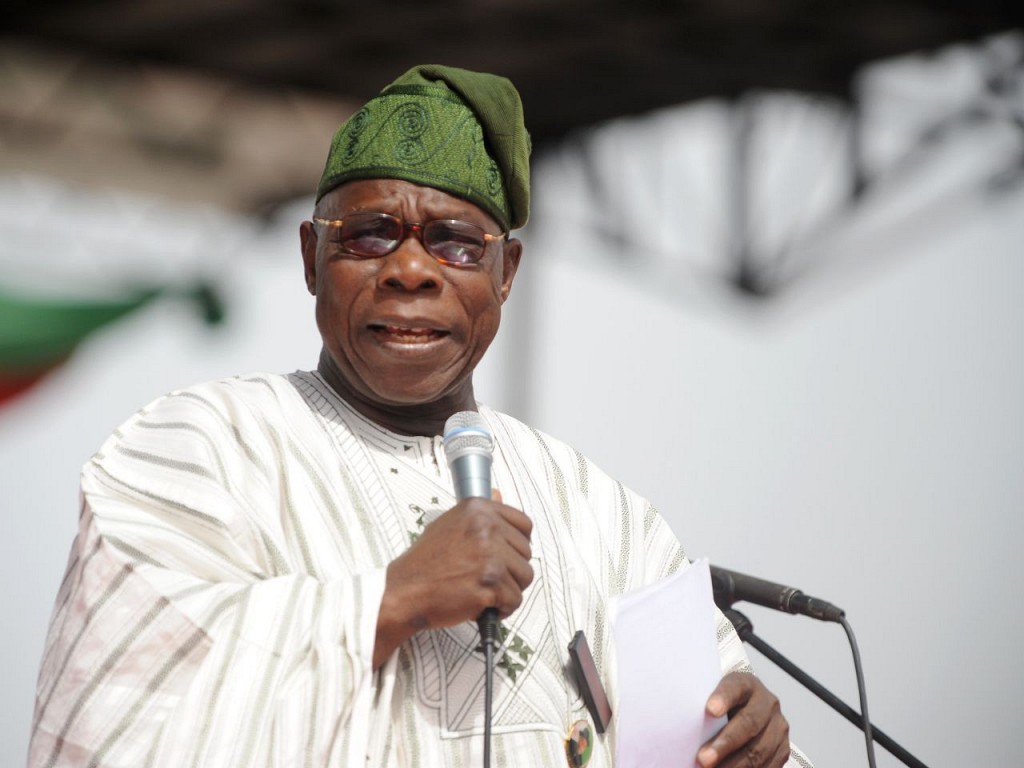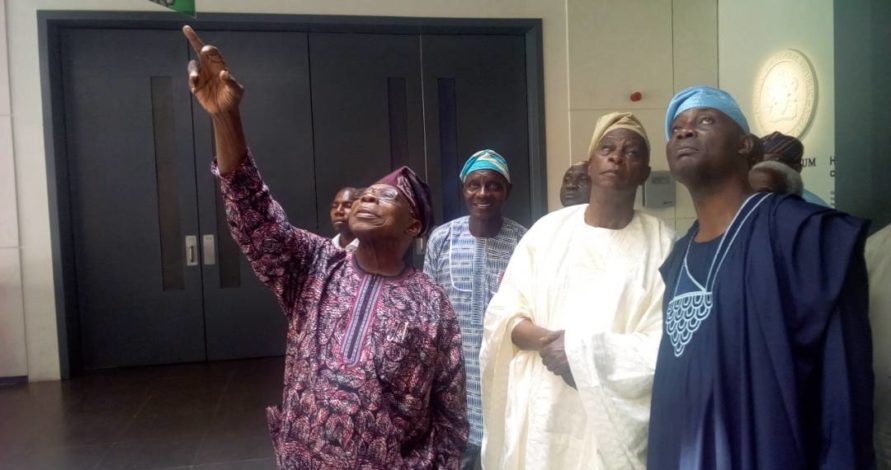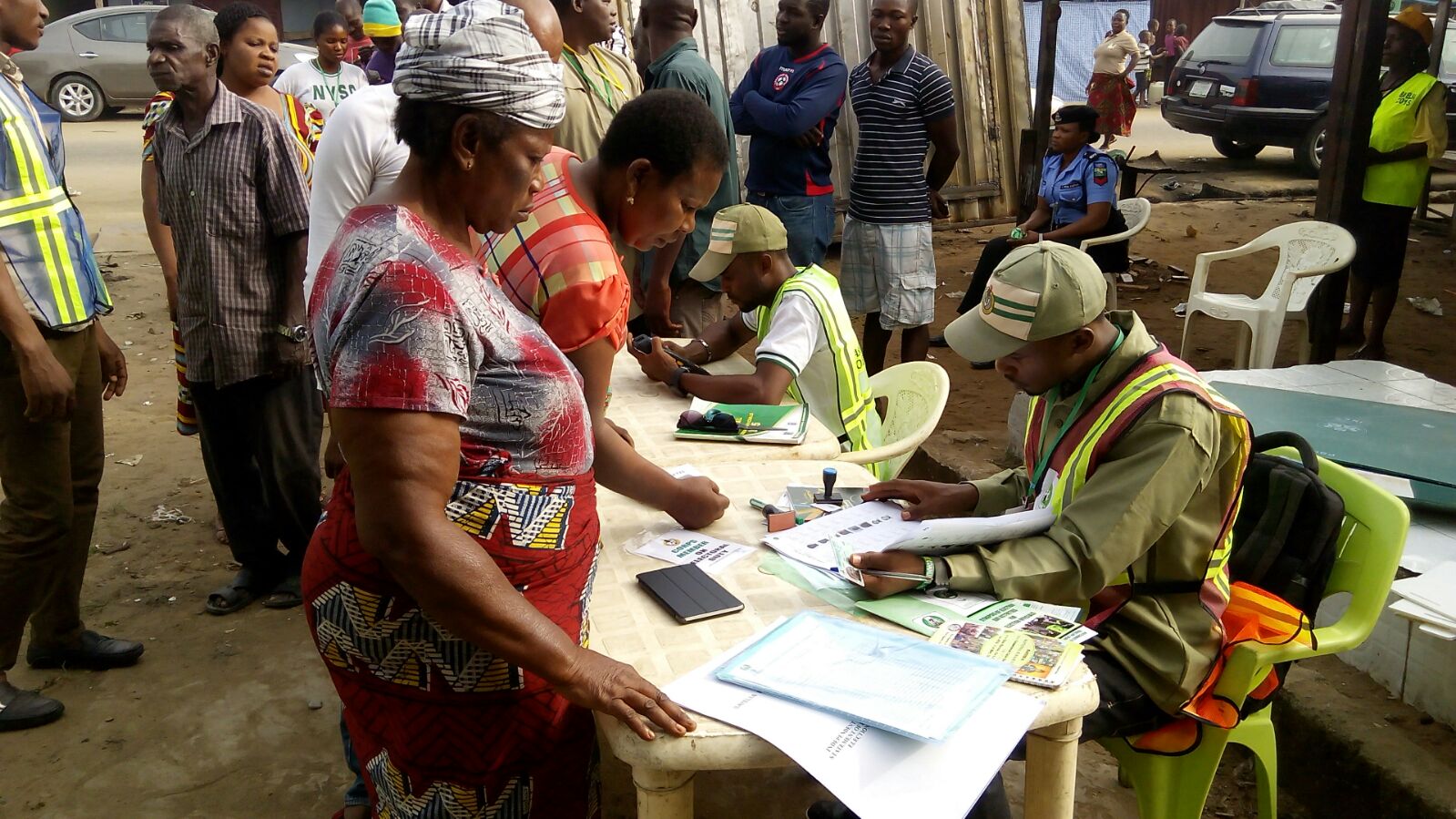Pic 18. From left; Chairman, Nigeria labour congress Enugu State chapter, Comrade Virginus Nwobodo; Gov. Ifeanyi Ugwuanyi of Enugu State and chairman Trade Union Congress Enugu State chapter, Comrade Chukwuma Igbokwe during the 2017 May Day celebration in Enugu on Monday (1/5/17).
02382/1/5/2017/Michael Agada/EO/NAN
It may have itself been just another soapbox catchphrase, but nothing best illustrates the chasm between campaign promises and the reality of governance like this often cited quote by the late American politician and former governor of New York, Mario Cuomo: “You campaign in poetry; you govern in prose.”
Implicit in these words is the notion that politicians tend to make pledges on the campaign trail that are either realistically unattainable, or that they simply lack any willingness to fulfill. Whatever might be the case, such failure has resulted inevitably in increasing alienation of the electorate and given rise to a troubling degree of public cynicism that is at worst dismissive of even the most well-intentioned state policy, or at best indifferent.
The Nigerian experience is no exception. And at no time has this shortcoming been as stark in our history as the present day when states are unabashedly unable to meet their most statutory obligations, let alone fulfil promises made during campaigns. For many Nigerians, Cuomo’s very prescient words will certainly strike a resonant chord as the country gets in the throes of another Democracy Day celebrations.
Happily though, a few states like Enugu have bucked this pathetic trend, notching significant scores on development indices such as a BudgIT Nigeria report released a little over one year ago which revealed only three states (Enugu, Lagos and Rivers) had a capacity to meet their recurrent expenditure obligations. Several other socio-economic data released afterwards have affirmed Enugu State’s profile as a robust entity, the latest being the Economic Confidential’s Annual States Viability Index.
Advertisement
The index indicated that many states could barely survive without the monthly federal allocation, with just seven states (Lagos, Ogun, Rivers, Edo, Kwara, Enugu and Kano) recording an impressive IGR of over 30 percent of their monthly federal receipts. So the development seen in Enugu State is in spite – not because – of the monthly subvention it receives from the Federation Account Allocation Committee (FAAC). As last year’s figures from FAAC indicate, Enugu State is 24th on the list based on the quantum of allocation to the 36 states of the federation. This means it received the twelfth least amount in 2017.
How then is Enugu State able to accomplish feats which states with much higher federal earnings can only dream about? That capacity evidently stems from Governor Ifeanyi Ugwuanyi’s prudent deployment of resources and scrupulous fidelity to campaign promises, proof that while Cuomo’s grim prognosis may largely be true there are often a few exceptions. One important theme that featured regularly in the governor’s campaign speeches was his pledge to commit resources to developing the rural areas. Indeed, it was a commitment that would later be reinforced at his inauguration on May 29, 2015. “Enugu State under us will pay special attention to rural development because majority of our people live in the rural areas,” he had declared.
Being home to tracts of arable land, Governor Ugwuanyi understands both the immense benefits inherent in developing rural areas and the social crisis that neglecting them could actually create. Such understanding gleaned from years of interacting with the grassroots ultimately lies at the heart of that emphatic declaration. That insight also underpinned the goal to create more urban areas – or new cities – to disperse development away from the capital city to distant rural communities.
Advertisement
That resolve has resulted in the deployment of roughly N40b in the construction and rehabilitation of over 240 kilometres of roads, most of which are located in the rural areas, since 2015. Equally significant is the fact that Governor Ugwuanyi has not restricted these rehabilitation to state-owned roads. Close to N13 billion has been spent fixing federal roads in the state, despite the fact the federal government has yet to offset its N22b indebtedness to the state from previous interventions. The Ugwuanyi administration’s recent flag-off of construction work on the long abandoned Eha Amufu-Nkalagu federal road in Isi-Uzo Local Government Area is a fitting example. Fixing this 22-kilometre road will prove an economic boon to the surrounding agrarian communities where the evacuation of farm produce had been a cumbersome exercise.
Creating new cities means reduced pressure on Enugu, the historical city that owes its fame to the discovery of coal in its surrounding hills in 1909 and which has over the years borne the brunt of huge influx of people from rural communities seeking improved living conditions and better economic opportunities. This is because the ongoing rural development as conceived by Governor Ugwuanyi goes beyond mere roads rehabilitation; it is a holistic experience that incorporates every necessary social and economic factors, the absence of which normally propel rural dwellers to relocate to cities. An example is the N10m-project-for-every-community initiative, a grassroots development programme conceived by the Ugwuanyi administration to ensure government presence in the 450 autonomous communities in the state. Five million Naira cheques have since been disbursed to communities in the programme’s first phase to enable them to implement any project deemed expedient in their locality.
So it’s not campaign trail rhetoric when Governor Ugwuanyi says he met a one-city state on his inauguration. It was, more or less, stating the very obvious. Indeed, as a review of the situation in major towns in Enugu State such as Nsukka, Agbani, Udi and Awgu revealed then, the picture was anything but salutary. In Awgu, for instance, the absence of even a single commercial bank in a town that is both a local government headquarters and home to the National Youth Service Corps’ Orientation Camp is a grim statistic that highlights the socio-economic deficiencies fueling rural-urban migration in developing societies. A swift response in the form of an area-specific plan with both short and long term components has addressed this development deficit.
On a similar note, it is a particularly telling experience that there was no tarred road in Amurri, a satellite community less than one kilometre from Agbani, headquarters of Nkanu West Local Government and home to the Nigerian Law School and the Enugu State University of Science and Technology. Well, that was until an intervention by the Enugu State governor resulted in the construction of the erosion-threatened dusty stretch and only access road into the community, effectively putting an end to feelings of alienation which its residents had lived with for decades.
Advertisement
But sometimes the most profound legacies are not necessarily those self-evident works such as the projects cited earlier. The sheer physicality of road infrastructure and the attendant fizz they create often tend to obscure significant developments in equally critical areas of need such as health, education and agriculture where the Ugwuanyi administration’s achievements are no less compelling. For instance, the state’s free treatment for all pregnant women and children under five years at primary healthcare centres has clearly emerged as a model in a country still beset by an alarming infant and maternal mortality rates.
To further bolster the capacity of primary healthcare centres to cater to the needs of the people accessing treatments at these facilities located largely in the rural areas, the governor this month approved a one hundred percent increase in the programme’s monthly funding. That gesture which took the funding sum to N17m every month lays the foundation for another substantial reduction in the state’s infant and maternal mortality rate.
Just as significant, though yet to receive the kind of publicity it deserves, is the remarkable outcome engendered by sustained investment in education. One of the most reliable assessment benchmarks in education is the performance of students from states of the federation in national examinations. According to statistics from the Joint Admission and Matriculations Board published recently by Premium Times, students from Enugu State alongside Imo, Anambra, Oyo, Ogun and Delta have dominated admission trends in courses such as medicine and engineering for the last couple of years.
This dominance is the direct outcome of the Ugwuanyi administration’s investment in education that comes in the form of a robust recruitment programme intended to create an acceptable student-teacher ratio and, especially, bolster the presence of teachers in rural schools which had long suffered manpower deficit. There is as well sustained renovation of schools and construction of additional classrooms, with libraries and laboratories equipped with items like computers, books and other standard teaching aids. These, plus a well structured scholarship scheme account for the outstanding performance of Enugu students and the state’s near-zero percent of school-age children who are not in school.
Advertisement
There have been strong public denunciations – and rightly so – for states where public sector workers’ salaries have gone unpaid for months, with the helmsmen receiving unflattering labels verging on a lack of human kindness. Of course, whereas regular payment of salaries and pensions may be indicative of a benevolent heart, but doing so and scoring many other outstanding achievements amid an atmosphere of insufferable gloom point to a peerless ingenuity. For Ugwuanyi, the commitment to the prompt and regular payment of workers and pensioners is not negotiable (just for the records: civil servants in Enugu State are paid on the 23rd). The devotion is underpinned by the knowledge that an abdication of this responsibility will have dire consequences for the state’s economy.
Such insight is the reason small businesses have received an enduring attention in the last three years and it is, in fact, the driving spirit behind the Enugu State Traders Empowerment Programme, a raffle loosely fashioned after the UK National Sport Lottery launched in February 2017. The success of the scheme which has so far proved to be a potent micro-economic spur derives in part from the fact that winners (two hundred traders every month) reinvest the fifty thousand Naira lottery sum into their businesses, and largely due to the transparency that has characterized the entire process. These salutary features have staved off those encumbrances which usually make most empowerment programmes seem like a euphemism for political patronage or mere tokenism.
Advertisement
Various economic indices that boldly reaffirm the policy’s success have emerged since its launch, serving as further proof its introduction was a stroke of genius. Such statistics offer a strong sense of validation, but the personal experiences (and there are numerous such acclaim) of individuals whose lives it has impacted offer an even greater sense of reassurance. So the traders raffle is not a populist gesture; it is rather consistent with the governor’s vision to create wealth and boost private enterprise in the state which had long lived with the unflattering tag of a civil service economy. These, plus the desire to transform Enugu into the South-East region’s economic hub are goals the governor has pursued passionately since his inauguration.
Those convictions are as much driven by belief in the public good as they are by the knowledge that an improved living condition is an incentive for payment of taxes. They are as well at the heart of the decision to offset arrears of gratuities. In April, the governor approved that N100m be set aside monthly for the gradual payment of gratuities largely inherited from past administrations to retired civil servants in the state. Such commitment to workers’ welfare means the typically fractious relationship between labour and the government is non-existent in Enugu State, a point underscored by the state’s Trade Union Congress when they honoured Ugwuanyi as the “Most Labour-Friendly Governor”.
Advertisement
Nothing feeds the democratic culture better than inclusive governance, the like of which has taken firm roots in Enugu State. This is evident in the bipartisan ethos that guides the Ugwuanyi administration’s policies, unfettered by the narrow considerations of party affiliations which has earned the governor plaudits even from opposition figures. Indeed, it is seen in the conscious deployment of state resources to improve the lives of society’s most vulnerable. It reflects as well in the even spread of development across the 17 council areas of the state, and in the robust urban renewal projects launched in high-density communities that had endured environmental blights for years.
Thanks to this renewed vigour, neighbourhoods such as Abakpa Nike – an urban sprawl that is home to a third of the capital’s population – which had for most part of Enugu’s history been a byword for squalid living condition are experiencing a pleasant turnaround with public water supply now flowing in a substantial part. Other neighbourhoods with a similar history that have experienced a turnaround via the urban renewal project include Ngenevu, Uwani and Ugwuaji. Governor Ugwuanyi has through their upgrade demonstrated that heavily populated and blighted communities are by no means places politicians visit only during electoral campaigns. It’s no surprise then that Enugu is widely acknowledged as one of Nigeria’s most secure and peaceful states.
Advertisement
These are the real democracy dividends, a participatory experience where the people’s role as ultimate arbiters in the social contract is not mere lip service, but a truth constantly validated by the state’s unrelenting efforts to enhance their welfare as apparent in a checklist review of Governor Ugwuanyi’s four-point agenda (employment generation; enhanced social services and good governance; rural development; security and justice) enunciated during his campaign for office. So there is no doubt what the verdict will be on a man who has largely kept the terms of that contract.
Ani, formerly editor of ThisDay, The Saturday Newspaper and later Saturday Telegraph, is a senior communications aide to the governor of Enugu State.
Views expressed by contributors are strictly personal and not of TheCable.
Add a comment







